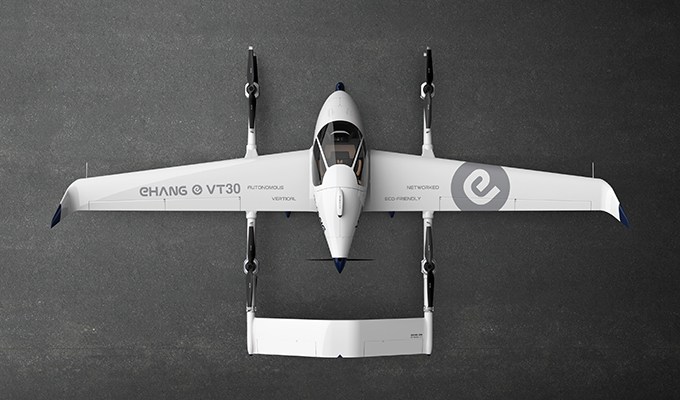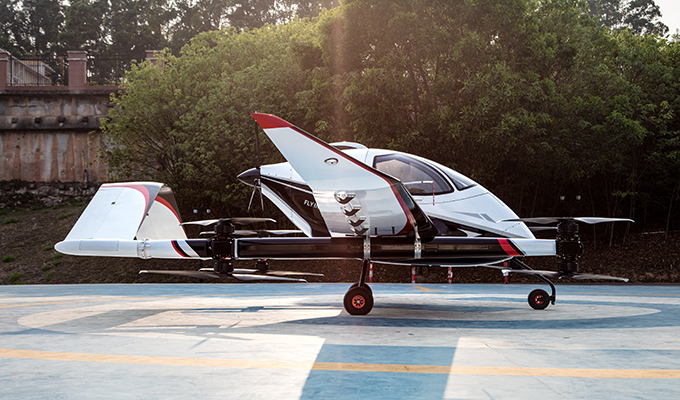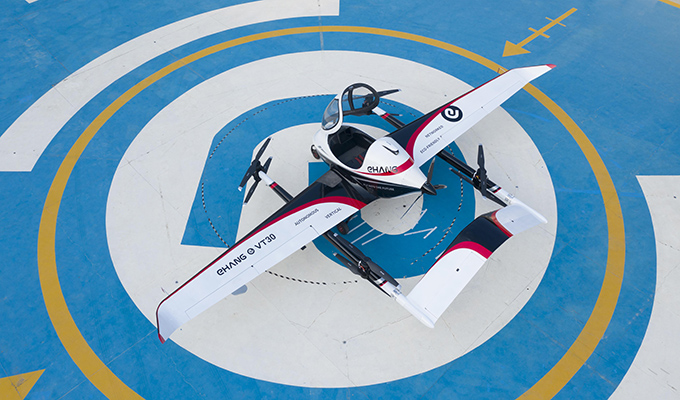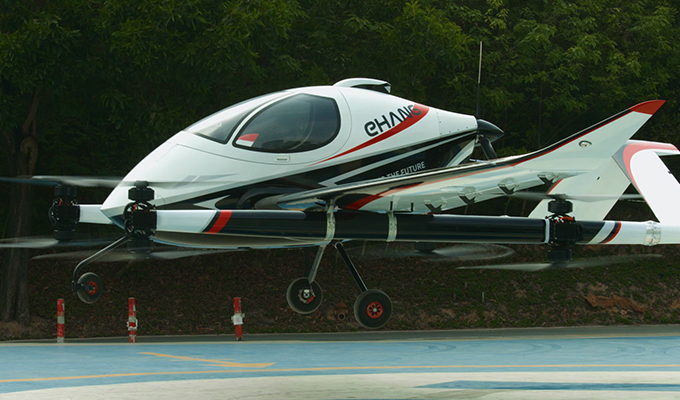Guangzhou, China, May 26, 2021 -- EHang Holdings Limited (Nasdaq: EH) (“EHang” or the “Company”), the world's leading autonomous aerial vehicle (“AAV”) technology platform company, today revealed its new type of electric passenger-grade AAV “VT-30”, the first in EHang’s product suite that is designed for inter-city transportation. With a hybrid structure, VT-30 is designed to travel a distance of up to 300km with a designed flight time of up to 100 minutes and is designed as a safe, convenient, efficient, eco-friendly and intelligent air mobility solutions for inter-city travel. As EHang’s long-range flagship product, VT-30 will complement EH216, a product focusing on intra-city air mobility, to further expand the air transportation network and improve the future urban air mobility (“UAM”) ecosystem.

VT-30 has a streamlined fuselage with a combined lifting rudder surface at the tail. Equipped with eight propellers on both sides, it has a pair of fixed wings, and a propelling propeller at the rear, which are designed to achieve a maximum balance of hybrid lift and push. The distinctive design enables VT-30 to enjoy the advantage of both vertical and taxi take-off / landing modes, while satisfying the need for longer distance and flight time. Unlike conventional fixed-wing aircrafts, it saves the runway for take-off and landing. Moreover, the tri-redundancy fly-by-wire control system can be flexibly altered into multiple modes, implying a much higher safety level for the aircraft.


VT-30 is geared towards inter-city travels among city clusters (such as the Guangdong-Hong Kong-Macao Greater Bay Area, Yangtze River Delta, Bohai Rim, etc.), as it is able to carry two passengers from one city to another. VT-30 boasts the merits of eco-friendliness, zero emissions, and low noise, fully aligned with EHang’s principle of green travel. Compared with conventional inter-city transportation modes, VT-30 is expected to provide more efficient, environmentally friendly and low-cost solutions to urban dwellers as well as expanding the capacity of existing UAM services.
So far, VT-30 has conducted vertical take-off and landing, power system and other tests. Moving forward, EHang will continue to conduct various tests and optimizations under different environment conditions, while continuously improving AAV safety and stability, with the goal of accelerating long-distance AAVs to be used in various scenarios such as air commuting, aerial sightseeing, and aerial logistics.

“Our passenger-grade AAV EH216 is already fully equipped to travel in the cities with its lightweighted and streamlined structure, and the launch of the VT-30 provides a powerful complement to the inter-city air traffic network by meeting needs for covering longer distance,” said Mr. Huazhi Hu, Founder, Chairman and CEO of EHang, “Moving forward, these two product series will be used as core development for a service-oriented operations strategy to improve the safety, duration and capacity for carrying both passengers and goods. We will work continuously to obtain regulatory certification for our various AAV products, including the VT-30, and provide a more convenient and efficient public urban air mobility operational services.”
About EHang
EHang (Nasdaq: EH) is the world's leading autonomous aerial vehicle (AAV) technology platform company. Our mission is to make safe, autonomous, and eco-friendly air mobility accessible to everyone. EHang provides customers in various industries with AAV products and commercial solutions: air mobility (including passenger transportation and logistics), smart city management, and aerial media solutions. As the forerunner of cutting-edge AAV technologies and commercial solutions in the global Urban Air Mobility (UAM) industry, EHang continues to explore the boundaries of the sky to make flying technologies benefit our life in smart cities. For more information, please visit www.ehang.com.
Safe Harbor Statement
This press release contains statements that may constitute “forward-looking” statements pursuant to the “safe harbor” provisions of the U.S. Private Securities Litigation Reform Act of 1995. These forward-looking statements can be identified by terminology such as “will,” “expects,” “anticipates,” “aims,” “future,” “intends,” “plans,” “believes,” “estimates,” “likely to” and similar statements. Management has based these forward-looking statements on its current expectations, assumptions, estimates and projections. While they believe these expectations, assumptions, estimates and projections are reasonable, such forward-looking statements are only predictions and involve known and unknown risks and uncertainties, many of which are beyond management's control. These statements involve risks and uncertainties that may cause EHang's actual results, performance or achievements to differ materially from any future results, performance or achievements expressed or implied by these forward-looking statements.